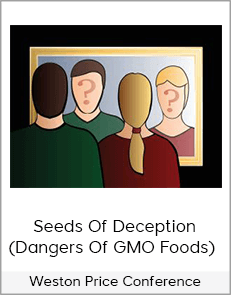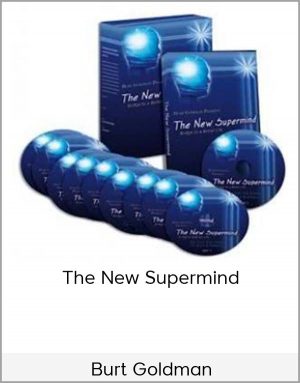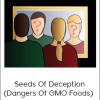Seeds of Deception (Dangers of GMO Foods) — Weston Price Conference
$30.00
British government–to the disturbing results of research into bovine growth hormone produced by genetic engineering.
Seeds Of Deception (Dangers Of GMO Foods) ” Weston Price Conference

Check it out: Seeds of Deception (Dangers of GMO Foods) — Weston Price Conference
“The Washington Post reported that mice, usually happy to munch on tomatoes, turned their noses up at the genetically modified FlavrSavr tomato that scientists were so anxious to test on them. . . . The mice were eventually force-fed the tomato through gastric tubes and stomach washes. Several developed stomach lesions; seven of forty died within two weeks. The tomato was approved without further tests.”
This is one of many reports admirably presented in Jeffrey Smith’s important book on genetically engineered organisms (GMOs), Seeds of Deception. Beginning with the shocking account of biochemist Arpad Pusztai’s fate–he found that rats fed genetically altered potatoes suffered damaged immune systems, had less developed brains, livers and testicles and structural changes and a proliferation of cells in the stomach and intestines presaging cancer, was subsequently fired from the job he had held for 30 years and vilified by the British government–to the disturbing results of research into bovine growth hormone produced by genetic engineering.
Journalists have dedicated much paper and ink to the environmental and economic problems posed by genetically engineered seeds; but this is the first book to focus on the health hazards posed by the new technology. The effects of foreign genetic material on the host cell’s normal DNA, the little-understood phenomena of gene transfer, gene repositioning, gene silencing, gene stacking and code rearranging, result in a wide range of unpredictable effects. For example, when Dr. Pusztai fed a particular lectin–a natural insecticidal poison that some plants produce to ward off insects–to rats, they showed no apparent damage. But when the lectin had been genetically inserted into potato DNA, the effects on the rats were disastrous. It is the interaction of foreign DNA material with that of the host that poses so many unforeseeable hazards. Yet the industry insists that GMOs need not be tested, and has the political influence to ensure that no governmental agency will exercise the requisite oversight.
The most serious threat involves GMO production of micronutrients. During the 1980s, hundreds of Americans contracted eosinophilia-myalgia syndrome (EMS), characterized by crippling pain, severe rashes, paralyzing muscle spasms, concentration and memory difficulties and irritable bowel syndrome. The cause was finally traced to genetically engineered L-tryptophan, produced by Showa Denko, a Japanese company. L-tryptophan produced by non-GMO bacteria did not have this effect. Responding to industry influence, the FDA made no mention of the fact that the genetic engineering was to blame, but removed all L-tryptophan from the market in a blanket condemnation of a supplement that had helped thousands of people counteract insomnia, premenstrual tension, stress and depression.
There are many supplements today that are produced with GMO bacteria. A form of GMO-derived vitamin B2 has been approved in the UK. Such nutrients are routinely added to a variety of foods, including white flour, as “enrichments,” a threat to the health of the entire populace, one that is extremely hard to avoid.
Fortunately the GMO food industry is in trouble. Europe has rejected GMOs and foods made with them, and African nations will not even accept GMO seeds given as food aid. This book will help do what our government has failed to do–bring about the demise of an industry that should never have begun.



















